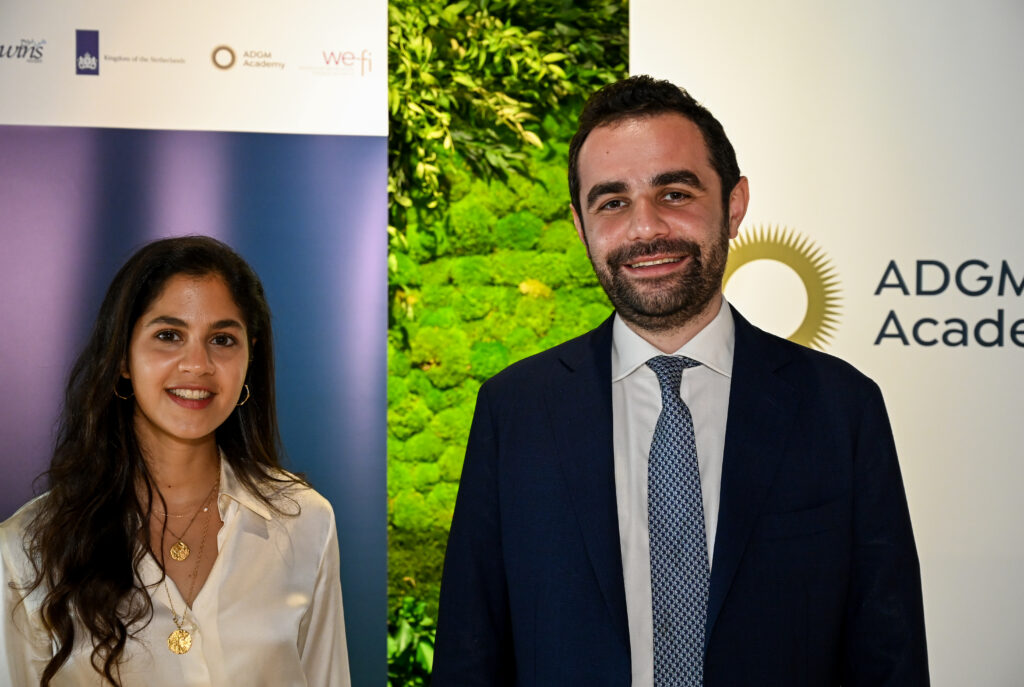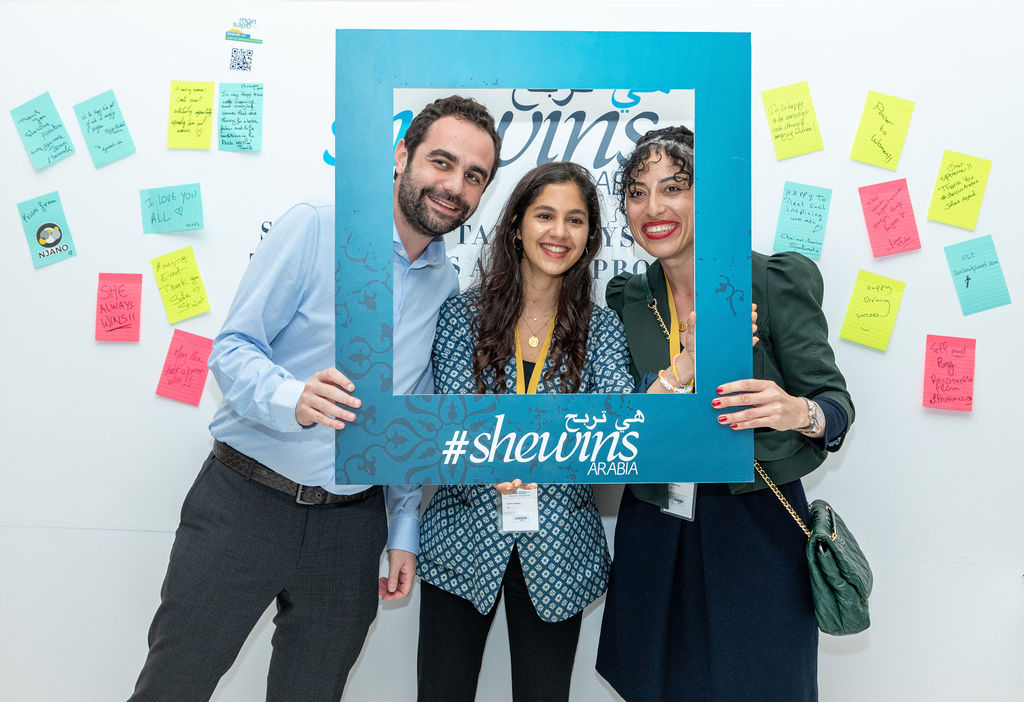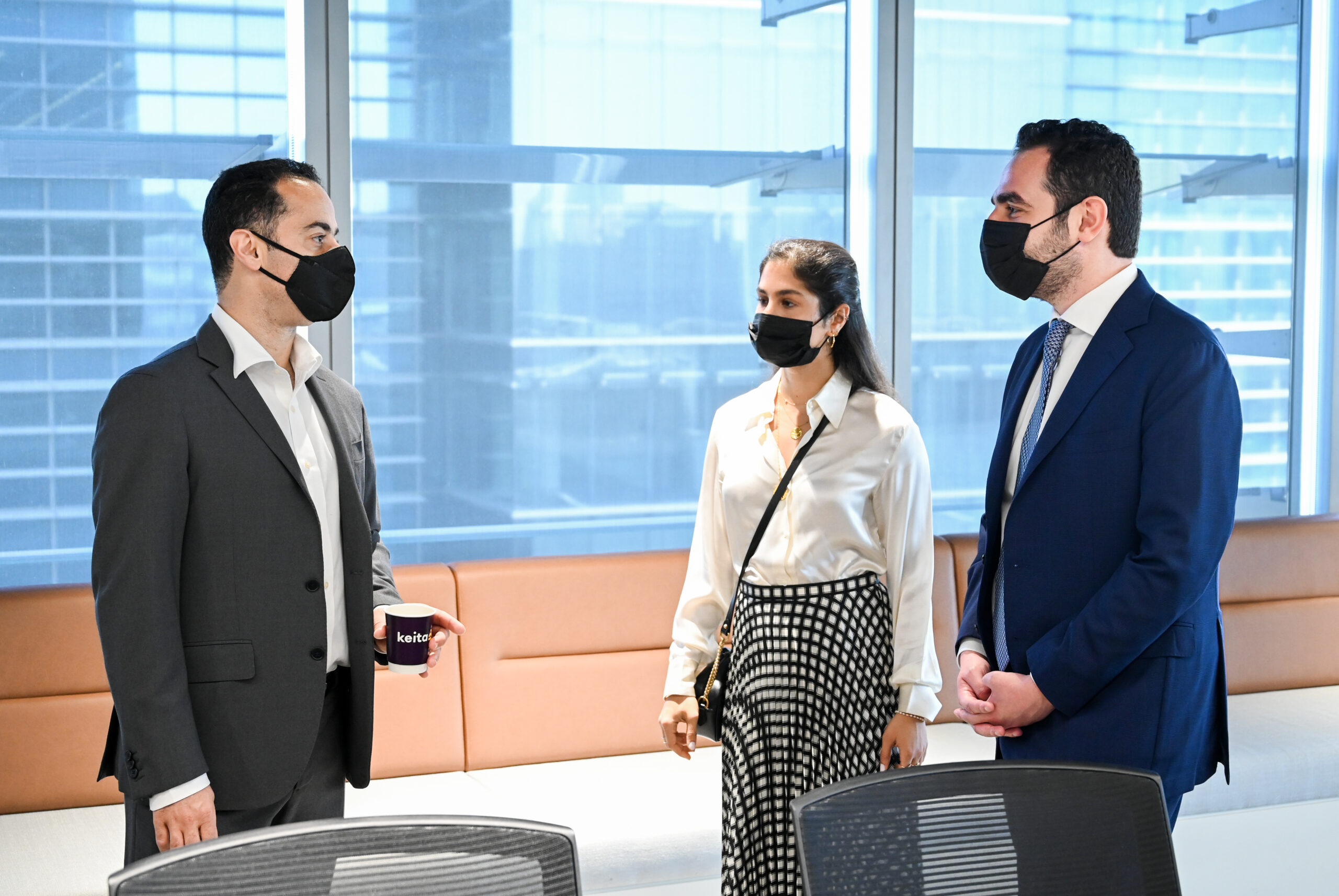Moustafa Salem and Deema Khaldoon Alghunaim, co-leads of IFC’s She Wins Arabia project, spoke with We-Fi about gender gaps in the Middle East and Northern Africa (MENA), and their experience working with women entrepreneurs from the region.
Q: Can you tell us a bit about your background, and what inspired you to start working in development?
Moustafa: I worked in the development field for the greater part of my career in various international organizations. My main area of focus is employability and private sector development whereby I managed projects that aimed to improve working conditions for employees. This included improving transportation and mobility for blue-collar workers in factories and developing policies and procedures that enhanced employee benefits. I also worked on gender diversity management projects that supported the recruitment, retention, and career advancement of women employees at private sector companies. This enabled more women to access the economy through advising companies on the workplace benefits and opportunities of having a gender-balanced workforce. My inspiration to work in the development field comes from my desire to create a positive impact on people’s lives. Through a project like She Wins Arabia, you see the impact of your work almost every day.
Deema: Throughout my career I’ve worked in different facets of development. I started off with public sector consulting, shifted to policy analysis based work, and finally moved to partnership development before starting with IFC. My academic background is in political science and international development with a focus on the role of institutions and organizations in shaping development trajectories. Ultimately, I’ve always had an interest in the nexus between the private and public spheres and understanding how the private sector can be leveraged as a source for good in achieving development outcomes and driving transformation in societies. I think a focus on the private sector is a central component of raising living standards and creating long-term prosperity.

Q: Could you tell us about your project ‘She Wins Arabia’ – what’s your role and how did you get involved in it? What do you think are its most fascinating aspects?
Moustafa: She Wins Arabia aims to address a clear market gap in the financing of women-led startups in MENA. The initiative aims to help women entrepreneurs get the support and financing they need to grow their businesses. One way the project aims to achieve this goal is by offering tailor-made support to key ecosystem players, such as accelerators and funds, to strengthen their capacities in supporting women entrepreneurs. Together with Deema, I have been co-leading the project and it has overall been a great experience. One of the most enriching aspects was that we managed to connect a network of more than 100 ecosystem players so far, which has been a fascinating journey!
The most interesting part about this project is the community we’ve built that is eager to support women-led startups. From fund managers, private-sector companies, and established women entrepreneurs we saw how committed the MENA region’s key players are in enabling more opportunities and financing for women-led startups. Leveraging this opportunity to connect them altogether, through She Wins Arabia, was the most fascinating aspect of this project. Also, seeing a strong connection between the entrepreneurs and their willingness to help each other grow in a non-competitive way was amazing to see.
Deema: She Wins Arabia is a pan-MENA female entrepreneurship support program. The project has three key components: an investment readiness training for female-led startups which was delivered to more than 80 women entrepreneurs from across the region, the best of which were invited to pitch in the pitch competition that took place in the United Arab Emirates (UAE); a gender lens investment training for fund managers which was delivered to representatives of 15 funds from across the region; and an upcoming gender sensitization training for accelerators and incubators. The idea was to provide support as well as to create visibility for female entrepreneurs, while also working with key ecosystem support players from the region to ensure durability and maximize the long-term impact and change created in the regional startup landscape from a gender parity perspective. I have been working on the project since its inception, co-leading on the design and implementation of the various components. It’s been a very hands-on and rewarding experience.
In my opinion, the most fascinating aspect of She Wins is how the project architecture focuses not only on supporting women-led businesses but also on working to support key ecosystem players through gender-sensitized training. This sort of ‘training of trainers’ ensures a long-lasting impact within the ecosystem after the project lifespan officially ends and was a gap we identified during our initial mapping analysis. I think it was also fascinating to see how aside from the direct beneficiaries, we saw a lot of interest and enthusiasm from various stakeholders willing to partner and contribute on a voluntary basis, be it as guest speakers, judges, and prize sponsors. I think this is a testament to the widespread understanding that more can and needs to be done to better support women and the broader entrepreneurship agenda across MENA.
Q: Women-led businesses in developing countries are facing many barriers and biases. Could you name the one change that you’d like to see in the region you work in?
Deema: Personally, one front I am particularly passionate about is legal change. The legal obstacles of course vary from country to country, but on average MENA’s 2021 Women Business and the Law score is 51.5 out of 100, the lowest of all regions. While cultural mindsets and biases can take some time to overcome, the law plays a powerful role in propelling and catalyzing change, and empowering women to claim their rights. And we’re seeing it happen with a wave of legislative reforms focused on enhancing women’s economic participation introduced in the UAE, Saudi Arabia, and Jordan over the past two years. These reforms are critical to providing a legal basis for women to both start and grow their businesses.
Q: There is a refrain we have heard more recently from women entrepreneurs and people working with WSMEs in developing economies that they are “over-mentored and under-financed”. What is your experience, and can one go without the other?
Moustafa: I am not surprised at all by this statement. This is something we realized throughout the project’s scoping and delivery. There’s an abundance of programs that offer mentorship, career development, and other capacity-building measures for women entrepreneurs. However, when it comes to bridging the financing gap there is a lot of room for improvement. This is evident just by looking at the data, which clearly highlights that women-led enterprises receive only a fraction of the funding of male-led businesses. However, we can see a gradual shift in this paradigm. Several gender-lens investing funds have started to pop up across the region. In fact, during the She Wins Arabia gender-lens investing training for fund managers, we saw several funds commit to concrete measures that would enable enhanced access to finance opportunities for women-led startups in the MENA region. We are happy to see this shifting mindset take place through She Wins Arabia. However, we also need to see other international organizations work more on levelling the playing field.
Deema: Unfortunately, there is some truth to this statement. According to research by Wamda, in 2021 female founders raised only 1.2 percent of total funding in MENA. This phenomenon isn’t specific to MENA and is reflective of a global trend. With She Wins, we intentionally targeted earlier-stage startups and enterprises to undergo our investment readiness training. This training, which was sort of a bootcamp for understanding core business fundamentals as well as developing soft skills and pitching skills, would help to bridge the financing gap. But beyond the training, the She Wins initiative sought to provide a platform for these female entrepreneurs to engage with the funding ecosystem in meaningful and sustainable ways. While it has been well established that investing in women and women-led teams brings benefits, including higher returns on investment and more diversity in thought, ecosystem players can perpetuate the idea that women founders are left behind because they are not ready enough or good enough or experienced enough. To overcome this, through both the fund manager training and the upcoming accelerator and incubator training, She Wins seeks to not only build the business case of why investing in women is beneficial, but also take it a step beyond and foster honest dialogues amongst regional players. Initiating these conversations is a first step towards changing perspectives and overcoming prevailing biases to help female entrepreneurs gain access to equal opportunities on an equal footing with their male peers.

Q: What is the experience that struck you the most as you are planning or implementing this project?
Moustafa: Meeting the project beneficiaries in-person and witnessing their enthusiasm towards this initiative was the most striking part of the implementation process. The pandemic has halted opportunities for face-to-face interactions, and I think we almost forgot how important that was. Therefore, having the opportunity to meet in the UAE was of great added value and allowed us to witness in person the great achievements reached through this project. One of the most enriching moments was the networking event we held for fund managers after the training. During the event, beneficiaries engaged with one another and exchanged knowledge on how they can develop projects to support fellow women-led startups. It was great to see a diverse and experienced group from across MENA come together and brainstorm ideas for such an important topic.
Deema: I found it inspirational and touching really to see the relationships built amongst the women and the community in such a short span of time. All the entrepreneurs underwent the training virtually so it was great to see them meet up in person in the UAE. The relationships built amongst the entrepreneurs were based on a genuine desire to support one another with no competitiveness, in spite of it being a competition! When we were interacting with the women on the ground it also gave us exposure to their personal realities; one founder came to the pitch competition with her daughter, a few from Yemen weren’t able to travel. These moments gave us a window into the reality of the day-to-day experience of being a female founder in MENA, and is something we would not have been able to witness had this been done virtually.
Q: What have you learned from your experience managing a We-Fi project? What advice would you give to other implementing partners as they design programs that support women entrepreneurs?
Moustafa: The most important piece of advice is developing a project that addresses a clear market gap in terms of supporting women entrepreneurs. This can be achieved through research and scoping but most importantly talking to the ecosystem players. One aspect we benefited from was holding ongoing calls with various stakeholders in the MENA startup ecosystem to learn about the challenges, constraints, and opportunities regarding support to women-led startups. Desk research in the project development phase is not enough. You need to speak to people and understand more about the gaps in the ecosystem. Also, I think it’s very important to be flexible. No matter how robust the project design is or how concrete the timeline of activities, you must always be ready to pivot as surprises will arise throughout the implementation process.
Deema: I think one factor that was key to ensuring the project’s success was having frequent touchpoints with experts from within IFC as well We-Fi and ensuring the project team was never operating in a silo. We spoke with a lot of teams at various critical points in our decision-making process to get their expertise, consulting everyone from investment experts to communications officers. Having that well-rounded and holistic understanding of how to design the project to best meet the objective ultimately helped us create the most impact.

